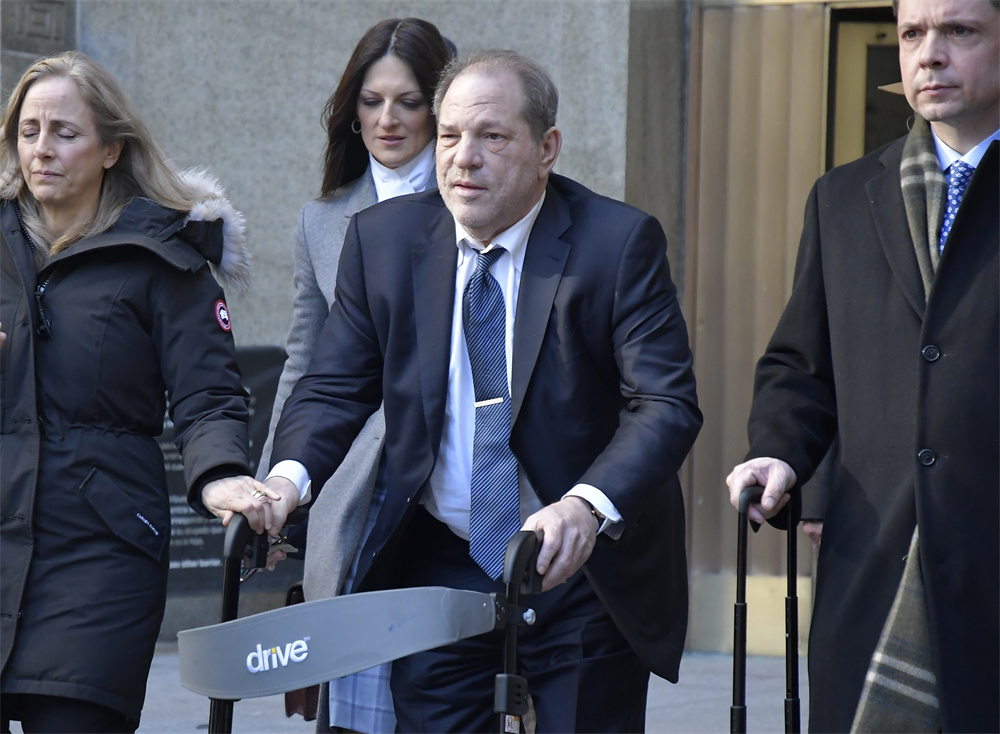
On April 25th local time, the New York Court of Appeals made a shocking ruling: the verdict in the sexual assault case of Harvey Weinstein, a 72-year-old rapist, in 2020 was overturned and a new trial was required at a later date.

On February 21, 2020, local time, in New York, the United States, Harvey Weinstein, former co-chairman of the Weinstein Company, left the New York State Supreme Court accompanied by lawyer Donna Rotunno. Visual China Photo
The presiding judge summoned the "Molyneux" witness to violate the principle of presumption of innocence
Harvey Weinstein, once a top producer, was exposed by the media for sexual assault in 2017. This set off a massive anti-sexual assault movement in Hollywood, which has spread to the world and is still going on. As the initiator, Weinstein has been accused by more than 100 women in the following years, including Hollywood stars such as Ashley Judd and Uma Thurman. They told the media that Weinstein had used his position in the industry to commit various violations including rape, sexual assault and harassment.
However, only a few of these charges were successfully filed and won. In February 2020, a New York State jury found him guilty of raping actress Jessica Mann in 2013 and forcibly molesting Miriam Haley, a production assistant on the reality show Project Runway, in 2006. The Manhattan Supreme Court sentenced him to 23 years in prison.
In 2022, Weinstein's attorney took the case to the intermediate appellate unit of the New York State judicial system. But in June of that year, the five judges of the New York Supreme Court Appellate Division voted unanimously to dismiss his appeal. In July, his lawyer continued to appeal and went to the New York Court of Appeals, which represents the highest legal authority in New York State. The appeal was accepted last year. After nearly a year of "hard work", Weinstein finally got the result he wanted.
The seven judges of the Court of Appeal (four women and three men) voted 4 to 3 (three of the four votes were from women) to overturn the court's decision. The main reason for the four judges was that the then presiding judge James Burke made a mistake and should not allow three additional witnesses to testify in court because they were all so-called "Molyneux" witnesses. The content of their testimony on Weinstein's "past bad behavior" was not within the scope of the case, which was unfair to the defendant Weinstein.
The term "Molyneux" witness was born in the New York State judicial system. It comes from the Molyneux murder case that happened more than a hundred years ago. At that time, pharmacist Roland Molyneux was charged with poisoning and murder. The incident happened on December 28, 1898. In order to avenge a personal vendetta, Molyneux sent a bottle of poison to his old enemy named Harry Cornish: the label on the outside said carbonated water for treating heartburn, but it actually contained highly toxic mercuric cyanide. Unexpectedly, the poison was eventually taken by Catherine Adams, a relative who lived with Cornish, and caused her death.
In February 1900, Molyneux was sentenced to death. While awaiting execution, his attorney took the case to the New York Court of Appeals, where he was eventually sentenced. Judge William Wiener's claim was summarized as the Molyneux Rule, which simply means that each case should be treated as a separate case, and crimes not charged in the indictment should not be included in the scope of this case. The original intention of doing so was to protect civil rights. Just because the defendant had committed similar crimes in the past, it cannot be assumed that he is guilty this time; the jury must make a judgment on the facts of the crime, rather than convicting the defendant based on his personality, habits, and temper.
When Molyneux first went to court, the prosecution produced a lot of evidence suggesting that Molyneux had previously poisoned a rival, also by mailing liquid mercury cyanide. Although the chain of evidence was relatively complete, for various reasons, the case of poisoning the rival was never formally filed. Therefore, the Court of Appeal determined that using unproven so-called evidence to accuse Molyneux of another murder that had nothing to do with the case he was charged with violated the basic principle of "innocent until proven guilty" and misled the jury, preventing them from focusing fully on the case the defendant was actually charged with.
In November 1902, Molyneux was retried and acquitted, and the original prosecutor was dismissed. For more than a hundred years, as the highest legal body in New York State, the New York Court of Appeals has always insisted on implementing the Molyneux Rule, and this time was no exception.
The three "Molyneux" witnesses who testified against Weinstein in 2020 included actress Lauren Young, who told the jury in 2020 that Weinstein had sexually assaulted her and masturbated in front of her in the name of discussing a script. Her testimony describing the movie mogul's private parts ("like it was cut off and sewn back together") was widely cited by the American media as the title of the article.
Another witness, Dawn Dunning, claimed that she met Weinstein when she was a waitress in a nightclub in New York in 2004. Weinstein promised to help her realize her dream of becoming an actress. He touched her during a private meeting and promised that if she was willing to have a "threesome" with his assistant, he would immediately give her three film contracts. Another witness, model Tarale Wulff, had a similar situation. She said that she met Weinstein when she was a waitress in a bar in 2005, and Weinstein raped her when they were discussing the script a week later.
In fact, back in the 2020 trial, Weinstein's attorney opposed the prosecution's practice of calling these three witnesses. But the prosecutor insisted that the testimony of the three people could show that Weinstein's practice of hunting women had a fixed pattern and was simply a habitual offender. In the end, the presiding judge James Burke accepted the three "Molyneux" witnesses. This move aroused strong doubts from the defense lawyers at the time and complaints from the New York legal community, and in the end it directly led to the reversal of the case today.
At the end of 2022, the original presiding judge James Burke retired honorably. Even if he had not retired, the New York court would certainly choose another judge to retry the case in the future. The key is that the Court of Appeal also stated that when the case is retried, the prosecutor may not call these three witnesses to testify in court.
Even if the verdict is overturned, Weinstein will still have to serve his sentence
Back in the spring of 2020, the former movie mogul was found guilty and sentenced to decades in prison. This was seen as a huge victory for the anti-sexual assault movement in Hollywood and around the world, and countless victims of sexual violence shouted that justice was finally coming. However, four years later in the spring, the original verdict was overturned, which naturally aroused a strong backlash from the American people.
On April 26, local time, the victim in the case, Miriam Harley, publicly stated that after hearing the news that her conviction had been overturned, she felt "nauseous and wanted to vomit," but she really did not want to go through the torture of a trial again and was weighing whether she was willing to testify in court again.
"Of course, this is not just about me. This is a very important case and the focus of public attention. Going through this again is quite difficult for me personally, but it is also very important for the collective." She also emphasized that she believed that even without the testimony of the three "Molyneux" witnesses, Weinstein would still be very likely to be convicted again. "The truth will not change, the evidence is there."
Of course, in addition to the New York case, in October 2022, Weinstein, who was already serving his sentence, was sued in Los Angeles for 11 counts of rape, forced molestation and sexual assault that occurred between 2004 and 2013. In December of that year, the jury reached a resolution and found him guilty of three of the crimes. In February last year, a Los Angeles judge sentenced him to 16 years in prison, which will be served additionally after he has served his 23-year sentence in New York State.
It is reported that Weinstein's lawyers will also appeal the Los Angeles court's conviction before May 20. However, the Los Angeles District Attorney's Office told the media that they are confident that the original verdict will be upheld, mainly because there is no so-called "Molyneux" witness in the California legal system, and they explicitly allow more accusers to testify in sexual assault cases.
In fact, if it weren't for the conviction by the Los Angeles court, Harvey Weinstein, who is still in prison in New York State, would probably be temporarily free after a hearing on May 1, waiting for the next new trial schedule.
It now appears that Weinstein's order to register as a sex offender in New York State will likely be overturned after May 1. Even so, he will still have to serve the 16-year sentence imposed by the Los Angeles court, so he will continue to be imprisoned.
